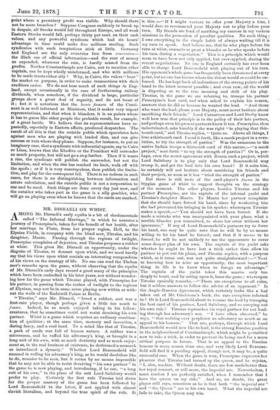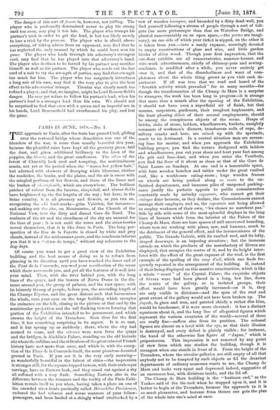MR. DISRAELI ON WHIST.
AMONG Mr. Disraeli's early squibs is a bit of rhodomontade called " The Infernal Marriage," in which he narrates a journey of Proserpine's, taken for the benefit of her health, after her marriage to Pluto, from her proper region, Hell, to the Elysian Fields, in company with the blind seer, Tiresias, and his daughter, Manto. Passing through the regions of twilight, Proserpine complains of dejection, and Tiresias proposes a rubber at whist. This gives Mr. Disraeli an opportunity, under the disguise of Tiresias, to descant upon whist, and we need hardly say that his views upon whist contain an interesting compendium of his views on the strategy of life. No one can read the Theban seer's remarks upon the game, without observing that the squibs of Mr. Disraeli's early days record a good many of the principles which have been embodied in his later years, nor without wonder- ing how far the game which Tiresias played, with Proserpine for his partner, in passing from the realms of twilight to the regions of Elysium, may not be in some sense playing now within or with- out the walls of the Radziwill Palace at Berlin.
Tiresias," says Mr. Disraeli, " loved a rubber, and was a first-rate player, though perhaps given a little too much to finesse. Indeed, he so much enjoyed taking in his fellow- creatures, that he sometimes could not resist deceiving his own partner. Whist is a game which requires no ordinary combina- tion of qualities ; at the same time, memory and invention, a daring fancy, and a cool head. To a mind like that of Tiresias, a pack of cards was full of human nature. A rubber was a microcosm, and he ruffed his adversary's king, or brought in a long suit of his own, with as much dexterity and as much enjoy- ment as, in the real business of existence, he dethroned a monarch or introduced a dynasty." Whether Lord Beaconsfield will succeed in ruffing his adversary's king, as he would doubtless like to do, remains to be seen, but it seems by no means impossible that he may not be able to resist deceiving " his own partner" in the game be is now playing, and introducing, if he can, " a long suit of his own," in the place of the suit Lord Salisbury would prefer to play. Certainly the first rule Tiresias laid down for the proper mastery of the game has been followed by Lord Beaconsfield to the letter, if not applied with almost slavish literalism, and beyond the true spirit of the rule. It is this :—" If I might venture to offer your Majesty a hint, I would dare to recommend your Majesty not to play before your turn. My friends are fond of ascribing my success in my various missions to the possession of peculiar qualities. No such thing ; I owe everything to the simple habit of always waiting till it is my turn to speak. And believe me, that he who plays before his turn at whist, commits as great a blunder as he who speaks before his turn during a negotiation." This is a principle which would seem to have been not only applied, but over-applied, during the recent negotiations. No one in England certainly has ever been able to charge Lord Beaconsfield with playing out of his turn. His opponent's whole game has frequently been threatened at every point, but no one has known where the threat would or could be en- forced. He has kept back all indications of the strong points of his hand to the latest moment possible ; and even now, all the world is disputing as to the true meaning and drift of his play. Tiresias, in the game we are referring to, trumps his partner Proserpine's best card, and when asked to explain his reason, answers that he did so because he wanted the lead. "And those who want the lead, please your Majesty, must never hesitate about sacrificing their friends." Lord Carnarvon and Lord Derby know well how true that principle is to the policy of their late partner, and perhaps even his present partners know it too. Proserpina, thus indoctrinated, asks humbly if she was right "in playing that thir- teenth card," and Tiresias replies, " Quite so. Above all things, I love a thirteenth card. I send it forth, like a mock project in a revo- lution, to try the strength of parties." Was the summons to the native Indian troops a thirteenth card of this nature,—" a mock project," sent forth "to try the strength of parties ?" Or is, per- haps, even the secret agreement with Russia such a project, which Lord Salisbury is to play only that Lord Beaconsfield may trump it, and get the lead into his own band? If it suits him, he certainly will not hesitate about sacrificing his friends and their project, so soon as it has "tried the strength of parties."
But there is still more of the card-player's finesse in the Stygian game of whist to suggest thoughts on the strategy of the moment. The other players, besides Tiresias and his partner Proserpine, are the captain of the infernal yacht and Tiresias's daughter Manto. To Manto her partner complains that she should have forced his hand, since by weakening him she had prevented his bringing in his spades; whereupon Tiresias makes a speech,—" You should not have been forced. If she made a mistake who was unacquainted with your plans, what a terrible blunder you committed, to share her error without her ignorance." If any of Lord Beaconsfield's partners try to force his hand, one may be quite sure that he will be by no means willing to let his hand be forced ; and that if it seems to be forced, he will be not unlikely to use the appearance to cover some deeper plan of his own. The captain of the yacht asks whether he ought to have lost a trick rather than allow his partner to put out his plans, and Tiresias replies, with a purpose which, as it turns out, was not quite straightforward :—" Next to knowing how to seize an opportunity, the most important thing in life is to know when to forego an advantage." The captain of the yacht takes this maxim only too deeply to heart, and by acting upon it, loses the game ; whereupon Tiresias cynically remarks,—" There are exceptions to all rules, but it seldom answers to follow the advice of an opponent." Is the Anglo-Russian Agreement, which certainly looks like a leaf taken out of Mr. Gladstone's book, the rare exception referred to ? Or is Lord Beaconsfield about to resume the lead by trumping the best card of his partner, Lord Salisbury, and so carrying out his own rule ? Tiresias reproaches his royal partner for not lead- ing through her adversary's ace. " I have often observed," he says, " that nothing ever perplexes an adversary so much as an appeal to his honour." That ace, perhaps, through which Lord Beaconsfield would now like to lead, is the strong Russian position in the neighourhood of Constantinople, which might be permitted now to take a trick, in order to prevent its being used for a more critical purpose in future. That is an, appeal to the Russian honour in more senses than one, and very likely Lord Beacons- field will find it a puzzling appeal, though not, it may be, a quite successful one. When the game is won, Proserpine expresses her pleasure that Tiresias had turned up the queen, and he rejoins, "I, also, madam. Without doubt, there are few cards better than her royal consort, or still more, the imperial ace. Nevertheless, I must confess I am perfectly satisfied, when I remember that I have the queen on my side." And so, no doubt, the great player still says, conscious as he is that both " the imperial ace " and "the Queen" are in his own hand. What the imperial ace fails to take, the Queen may win. The danger of this sort of finesse is, however, not trifling. The player who is profoundly determined never to play his strong card too soon, may play it too late. The player who trumps his partner's trick in order to get the lead, is but too likely merely to lose a trick by the process. The player who is afraid, above everything, of taking advice from an opponent, may find that he has neglected the only counsel by which he could have won his game. The player who leads through his adversary's strongest card, may find that he has played into that adversary's hand. The player who declines to be forced by his partner may sacrifice himself, as well as his partner. The player who sends out the last card of a suit to try the strength of parties, may find that strength too much for him. The player who too sanguinely introduces a long suit of his own, may find it the very play to give the best
effect to his adversaries' trumps. Tiresias was clearly much too refined a player, and that, we imagine, might be Lord Beaconsfield's danger. He may yet refuse to follow his partner's lead, when his partner's lead is a stronger lead than his own. We should not be surprised to find that even with a queen and an imperial ace in his hands, Lord Beaconsfield had overfinessed his play, and lost the game.



































 Previous page
Previous page